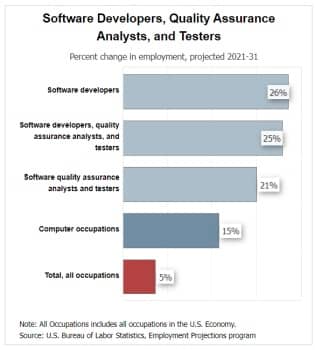A career as a developer can be exciting, creative, and lucrative. Let’s do a deep dive into the topic of Software Development and see if it’s right for you.

Types of Software Developers
The main distinction is between two types of Software Developers — Applications and Systems Developers.
Applications Software Developer
An Applications Software Developer writes and modifies the code making up programs for PC and mobile.
Systems Software Developer
A Systems Software Developer, on the other hand, is working on the Back-End, creating operating systems, database software, and networks.
The History of Software Development
The history of Software Development reaches back to the mid-1900s, when the first program to perform a mathematical operation was run on the computer “Manchester Baby” in England.
In the 1970’s and 80’s, Apple and IBM created the first personal computers, which jump-started the demand for Software Developers.
The field has continued to grow, over the last two decades especially: The rise of the internet and the ever-increasing need for software solutions across almost all industries have solidified the major role Software Development is playing in our time.
Job & Career Outlook
The Bureau of Labor Statistics estimates that during the 2020’s, Software Development jobs in the US will grow by 25% (versus 5% average for all fields), with over 400,000 more Software Developers becoming employed during that time.

Salary
The median salary of Software Developers in the US is just over $120,000 per year, with the lowest 10% earning around $64,000 and the highest 10% earning more than $168,000 per year.
Why Software Developer? The Benefits
Here are just a few of the benefits of being a Software Developer:
- Challenging and engaging work. Developers are using their expertise and cognitive ability to in solve pressing problems for their customers on a daily basis, adding value to the marketplace and the lives of others.
- Ability to work remotely. Coding tasks can be done from anywhere in the world, and video conferencing is often enough for team collaboration or client communication. The job of Software Developer is a prime candidate for being done remotely, and a reality for many currently working in the field.
- High potential for growth. As a Software Developer proves his extraordinary impact on a company’s results, he’ll be considered for positions such as Senior Software Engineer or Tech Lead. The potential to be paid above and beyond the already impressive starting pay and benefits of a Junior Developer — in exchange for taking on more responsibility inside the company — makes for an even more attractive career path.
Job Satisfaction
Are Software Developers happy with their job choice, then? According to StackOverflow, 70% are. These happy developers appreciate the high pay, plenty of free time and flexibility, as well as the ability to produce value and grow their profession is offering them.
Software Developer Job Description & Duties
“The person responsible for creating new software, launching it, and performing upkeep” is a concise job description of a Software Developer.
His duties include:
- Research.
- Software design.
- Writing code.
- Testing & debugging.
- Software deployment (launch).
- Code maintenance & software management.
- Communicating with his team (and occasionally, customers).
Languages
Some of the most common programming languages used in software development are:
Python
Python is an easy-to-learn language with many use cases. Hackerrank established that 50% of hiring managers are looking for Python skills in Software Developers.
Java
Java is in third place when it comes to in-demand languages from hiring managers. It’s an object-oriented language, which means that the developer uses objects containing code and data to create a program. Java is also easier to learn and use than some other software development languages.
C#
The C# (or C-Sharp) language, released by Microsoft in 2002, is getting more and more popular, mostly because it’s useful for making games and mobile apps. It is similarly powerful for desktop apps and enterprise solutions, though, making it a good choice for any Software Developer to learn.
C++
As a so-called low-level language, C++ is close to how a computer operates on a basic level. When you learn C++, you’ll get familiar with all intricate parts of computer programming. The language is very flexible and suitable for many different use cases, from Game Development to Machine Learning.
JavaScript
JavaScript is a highly popular language that’s used for developing web apps and servers. It’s fast, because programs written in JS run right in the browser. If a Software Developer plans to work on web apps either in the Front-End or Back-End, learning JavaScript is the way to go.
Software Developer vs Software Engineer – What’s the difference?
A Software Developer is working on the program itself — while the Software Engineer is applying Engineering principles to Software Development. The main difference between a Software Engineer and a Developer is that the former designs the architecture of a program, in addition to creating the code.
Current Demand
According to Hired.com, the demand for Software Developers/Engineers has risen by 17% in 2023 across all industries. The trend towards digitalization isn’t slowing down, so it is projected that even with the advent of AI, demand for developers will continue to increase.
The Highest-Paying Software Development Jobs
As a developer you can specialize in many different career fields. With these Software Dev jobs you can get paid up to $150,000 per year:
- Algorithm Developer
- Open Source Developer
- iOS Developer
- Software Development Manager
- Quantitative Developer
Skills
To be effective at their job and compete in the marketplace, Software Developers need a number of skills, both technical and non-technical (“soft” skills):
Technical Skills
These are the most important technical skills for Software Developers:
Programming logic. Much of a developer’s job is about solving problems, using the most sensible program structure and code. Proper programming logic is what will guide the developer to write successful software.
Programming language(s). A Software Developer should command at least one programming language at a good level — preferably multiple languages relevant to what he’ll be tasked with.
Writing clean, quality code. To write the most usable, efficient code, he needs to stick to clean code principles when creating his programs.
Algorithms & Data Structures. A Software Developer has to know these important building blocks of software programs and understand when and how to use each. This knowledge is also essential to passing a coding interview in the first place.
Soft Skills
Crucial non-technical skills for developers include:
Teamwork, Empathy & Leadership. While most developers are more introverted, connecting with coworkers is an important part of the job. As is the ability to set an example for others with positive actions, and to help pull the team through challenging times.
Communication, Confidence & Charisma. Being a personable, strong communicator lets you express ideas and explain concepts better, represent the company professionally and engagingly, not to mention opening up opportunities for your own career advancement.
Productivity & Emotional mastery. There’s no doubt Software Development can at times be a tough and frustrating job — and its complexity can lead to lapses in productivity. Software Developer burnout is a real issue. This is why developers need to be masters at managing their attention, time, and emotional state.
Negotiation. Negotiation is a valuable soft skill for developers that helps them get a higher salary and benefits, as well as aid the company in their dealings with customers.
How to become a Software Developer
- Start learning & building. The first step to becoming a Software Developer is building up the necessary skills. A proven approach is to pick simple programs you’d like to create, while at the same time studying the fundamental programming concepts you’ll need to know to complete those projects.
- Get academic accolades or certifications (optional). Some employers say they require a Bachelor’s or Master’s degree for a position as Software Developer in their company. In practice, what counts most is your demonstrable skill in finishing industry-relevant projects. Self-taught developers get into dream jobs all the time. While getting certified in Software Development might not always be necessary, it also won’t hurt, but rather help your chances of getting a high-paying job.
- Prepare for interviews. Software Developer interviews are a game of their own. Whenever you feel ready, start creating your coding interview preparation strategy. With a few months of focused study, you’ll be ready to take on whiteboard coding problems, programming challenges and behavioral questions. Wiith enough dedication to your job hunt, you’ll be able to land a job in the field sooner rather than later.
Courses
Learning sites such as Codecademy and Udemy offer abundant resources for the aspiring Software Developer. For a reasonable price, you can go all the way from your first steps to programming proficiency using their Software Development courses.
Software Development from A to Z at Udemy is the perfect course for beginners to start learning to code software from the ground up.
Codecademy's Full-Stack Engineer Career Path is a 6-month deep dive into front-end and back-end development.
Remember to keep working on your own projects alongside your coding education.
Degrees in Software Development
If you’re ready to commit a few years to a university education, you can choose to get a degree in Software Development.
There’s a myriad of options available to study in the US or internationally.
Job Security
Job security for Software Developers in the next years is hard to predict, considering the rise of AI, just like it is for most industries. The Bureau of Labor Statistics does estimate over 20% growth in the Software Development job market until 2030.
Yet it’s hard to say if automation won’t throw a wrench in the works.
One thing that’s for certain: Learning the skills needed for Software Development will still set you apart during the transitionary period into an AI-dominated future. And even after it has arrived fully, I can’t imagine the logic skills, problem-solving ability, and creative powers you’ve acquired as a developer not helping you cope with the challenges of such times better than most other people.
Best Resources for Software Developers
- Official documentations & tutorials. All programming languages feature free documentation and tutorials. They’re a good way for autodidact developers to get familiar with concepts and task execution in their chosen language.
- Paid education websites. The aforementioned Codecademy and Udemy, as well as many other great education platforms, will help you advance your technical and career skills as a Software Developer.
- Software development tools. From code editors and development environments, to language libraries, to productivity and project management tools: There’s plenty of apps out there making development possible or/and more efficient.
- Podcasts, YouTube and blogs. Today’s abundance of online Software Development content has you absorb valuable lessons learned by expert developers during decades of experience in the field.
- Programming books. Especially for a deeper dive into high-level concepts such as Software Architecture, creating clean code, look no further than some of the excellent programming books available.
- Developer communities. In forums like StackOverflow, LeetCode or Reddit, you can bond with your developer peers, ask for assistance with coding problems, share your own stories, or get inspired by those of others.
Software Developer Associations & Organizations
If you’re looking to further your involvement in the matters of Software Development as a profession, look into joining associations and organizations in the field, such as:
- Agile Alliance
- Association for Computing Machinery (ACM)
- Computing Technology Industry Association (CompTIA)
- Information Systems Security Association (ISSA)
- Network Professional Association (NPA)
- Society for Modeling & Simulation International (SCS)
You’ll be able to connect with peers and take advantage of networking opportunities.
What’s more, it’s a good credential to make your resume, website and social media profiles look more professional.
Job Openings
A good platform to look for jobs in Software Development is Triplebyte.


